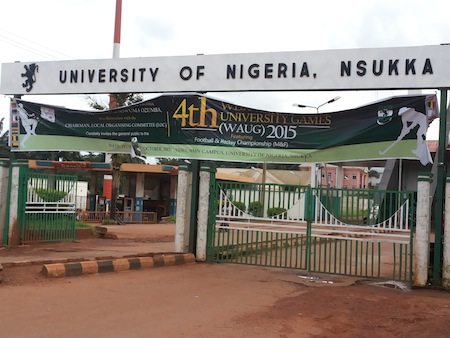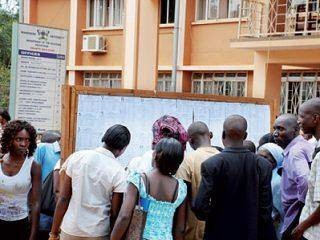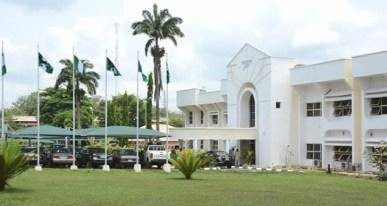
The University of Nigeria Nsukka (UNN) 2nd Supplementary Postgraduate admission for 2017/2018 academic session has been announced. The 2nd supplementary postgraduate admission is available in the courses below;
- FACULTY OF ARTS
(a) DEPARTMENT OF ARCHAEOLOGY AND TOURISM
PGD, M.A and Ph.D DEGREE PROGRAME
Polaeolithic Studies; Iron Age Archaeology; Origins of Food Production and Urbanization and Cultural Resources Management (Museum or Tourism Option).
- FACULTY OF ENVIRONMENTAL STUDIES
(a) DEPARTMENT OF ESTATE MANAGEMENT
POSTGRDUATE DIPLOMA PROGRAMME (PGD)
Entry Requirements
The entry requirements into the PGD programme in Estate Management is as stipulated in the currently revised postgraduate studies regulation of the University of Nigeria, Nsukka. The candidates are thus required to:
– Sit and Pass screening examination before being considered for admission.
– Be a graduate of the University of Nigeria or other recognized universities with at least a third class honours and having obtained a GPA of not less than 2.00 on a 5-point scale or its equivalent.
– Be holders of HND with a 3.50 GPA on a 5-point scale or its equivalent.
– Bea holder of 5 credits in WASC, GCE O/L OR NECO obtained in not more than two sittings to satisfy the basic university entry requirement for first degree course into the Department of Estate Management.
(b) MASTER OF REAL ESTATE (MRE) PROGRAMME
Entry Requirements
The entry requirements into the MRE programme are the same as stipulated in the Revised Postgraduate Studies Regulations for Master’s degree studies of the University of Nigeria.
- INSTITUTE OF EDUCATION (SANDWICH)
(a) POSTGRDUATE DIPLOMA PROGRAMME (PGD) IN CITIZENSHIP EDUCATION
Entry Requirements
A minimum of Bachelors degree or HND passed at distinction or upper credit in Education, Social Sciences or related fields like Arts (Communication, Fine Arts, Drama and Languages).
(b) POSTGRDUATE DIPLOMA PROGRAMME (PGD) IN GENDER EDUCATION
Entry Requirements
A candidate is qualified to apply with Bachelor’s degree or HND in any area of Education and Social Sciences, Arts and Sciences, passed at distinction or upper credit level.
(c) POSTGRDUATE DIPLOMA PROGRAMME (PGD) IN OFFICE ADMINISTRATION AND TECHNOLOGY EDUCATION
Entry Requirements
The entry requirement is Bachelor’s Degree or HND in any area of Education, Social Sciences, ICT or other professionals whose detailed academic records are acceptable to senate of the University of Nigeria may be admitted.
(d) POSTGRDUATE DIPLOMA PROGRAMME (PGD) IN WOMEN EDUCATION
Entry Requirements
The entry requirement is Bachelor’s Degree or HND in any area of Education, Social Sciences, ICT or other professionals whose detailed academic records are acceptable to senate of the University of Nigeria may be admitted.
- INSTITUTE OF CLIMATE CHANGE
PGD, M.Sc AND Ph.D PROGRAMMES
- Science of Climate Change
- Ground Based Measurement and Indigenous Technology Application to Climate Change
iii. Environmental Literacy and Policy Studies on Climate Change
- Sustainability Studies
- Studies on Environmental and Climate Change Laws.
Entry Requirements – PGD
The entry requirements into the PGD programme in Estate Management is as stipulated in the currently Revised Postgraduate Studies Regulation of the University of Nigeria, Nsukka. The candidates are thus required to:
- Sit and pass screening examination before being considered for admission.
- Be a graduate of the University of Nigeria or other recognized Universities with at least a third class honours and having obtained GPA of not less than 2.00 on a 5-points scale or its equivalent.
- Be holders of HND with a 3.50 GPA on a 5-point scale or its equivalent.
- Be a holder of 5 credits in WASC, GCE O/L or NECO obtained in not more than two sittings to satisfy the basic university entry requirement for first degree course into the Department of Estate Management.
Entry Requirements – M.Sc
The following shall qualify for the Master’s Degree admission:
(i) Candidates must satisfy the matriculation requirements of the University of Nigeria including credit pass in English and Mathematics
(ii) Candidates with a Bachelors Degree from the University of Nigeria or other approved universities whose programme is accredited by the NUC.
(iii) Candidates with a minimum of Second Class Lower Degree and a CGPA not less than 3.00 on a five-point scale.
(iv) Candidates with the Postgraduate Diploma in Climate Change Studies of the University of Nigeria or awarded by a recognized institution with not less than an upper credit.
Entry Requirements – Ph.D
(i) Candidates with an M.Sc Degree in Climate Change Studies with a CGPA of at least 3.5 on a 5.0 point scale.
(ii) A brief statement of intended area of research.
- INSTITUTE OF PUBLIC HEALTH Ph.D AND DRPH
ENTRY REQUIREMENTS
The following shall qualify for the Ph.D admission:
(i) Medical and Dental doctors who have passed the Part I Fellowship Examination can register for the Ph.D degree without the necessity of possessing the M.Sc degree
(ii) Professors who are already in the system, without Ph.D qualification, would be allowed to jointly supervise postgraduate students’ theses, with Professors who possess the Ph.D. However, young Professors, in Universities where Ph.D programmes are running, would be encouraged to enroll for the Ph.D.
The following shall qualify for the Master’s Degree admission:
(i) M.Sc in a relevant course with a minimum GPA of 4.00/5.00 (MPH for DrPH), or
(ii) The possession of Membership (which will require M.Sc/Ph.D) or
(iii) Fellowship of West African College of Physicians or National Postgraduate Medical College.
- FACULTY OF THE SOCIAL SCIENCES
(a) DEPARTMENT OF RELIGION AND CULTURAL STUDIES
PGD, M.A and Ph.D IN RELIGIOUS AND CULTURAL STUDIES
Biblical Studies: Old Testament, Biblical Studies: New Testament, Church History, African Traditional Religion, Religion and Society, Religion and Conflict Resolution.
Entry Requirements
PGD Programme
(i) Graduates of the University of Nigeria or other recognized universities who have obtained a degree of bachelor with at least a third class honours with GPA not less than 2.00 on a 5-point scale or its equivalent.
(ii) Candidates who hold other qualifications considered equivalent to the above and acceptable to the Board of Postgraduate Studies and Senate of the University may be admitted.
M.A. Programme
The following shall qualify for the Master’s degree admission:
(i) Graduates of the University of Nigeria or of other recognized universities who have obtained a degree of bachelor with at least a second class honours (lower division) with GPA not less than 2.50 on a 5-point scale or its. Also candidates with appropriate Postgraduate Diploma of the University of Nigeria or of other recognized Universities with at least a 3.50 GPA on a 5-point scale.
(ii) Candidates must possess a good Bachelors degree in Religion and its variants (e.g. Religious Studies, Religious and Cultural Studies, Religious Management and Cultural Studies, Christian or Islamic Religious Studies, Theology, etc.).
Ph.D Programme
(i) Candidate must possess a good Master’s degree in Religion or its variants from a recognized university, with a minimum CGPA of 3.0/4.0 or 3.5/5.0 or 60% and Project score not lower than 60% (B).
- FACULTY OF ENGINEERING
DEPARTMENT OF METALLURGICAL AND MATERIALS ENGINEERING
PGD, M.Engr and Ph.D in Metallurgical and Materials Engineering
(a) PHYSICAL/MECHANICAL METALLURGY
(i) Structure-property relationships; Phase transformations and mechanisms of microstructural change.
(ii) Strengthening mechanisms and failure analysis.
(iii) Coatings: Chemical vapor deposition; Coating materials, films and applications; Epitaxial growth; Interfacial science; Physical vapor deposition; Surface mechanics; Surface physics; Tribology of thin films and coatings.
(iv) Fatigue behavior of steels; Fracture Mechanics.
(v) Steel research: Advanced high strength steels; Advanced steel coatings; Carburized steels; Deformation behavior of steels; Fatigue behavior of steels; Forging steels; Fracture behavior of steels; microalloyed steels; Nickel-based Superalloys ; Quench and partitioned steels, Alloy design and micro-alloyed steel.
(vi) Welding engineering and development: Brazing of ultra-wide gaps; Explosive processing of materials; Laser welding and processing; Levitation for kinetics and surface tension evaluation; Materials joining processes; Pyrochemical kinetics studies using levitation; Underwater and under oil welding; Welding and joining science; Welding rod development; Welding stress management; Weld metallurgy Weld wire development.
(vii) Reactive metals properties.
(viii) Combustion synthesis.
(ix) Powder metallurgy.
(b) EXTRACTIVE/ MINERAL PROCESSING RESEARCH
(i) Chemical and physical processing of materials;
(ii) Mineral Processing:-Electrometallurgy; Hydrometallurgy; Pyro metallurgy;
(iii) Recycling and recovery of materials;
(iv) Thermo-chemistry and Thermodynamics,
(v) Thermal plasma processing.
(vi) Corrosion science and engineering
(C) ADVANCED MATERIALS SCIENCE RESEARCH
(i) Advanced polymeric materials and Thin Film:Advanced polymer membranes and thin films; Biopolymers Living/controlled polymerization; Organic-inorganic hybrid materials; Self- and directed-assembly.
(ii) Biomaterials: Structural medical alloys; Bio-mimetic and bio-inspired materials engineering; Failure of medical devices; Interfaces between materials and tissue; Tissue as a composite material; Structural medical alloys; Drug delivery.
(iii) Experimental Methods: Computer modeling and simulation; Mathematical modeling of material processes; 3D atom probe tomography; Atomic force microscopy; Electron microscopy; Nanoindentation; Non-destructive evaluation; X-ray diffraction
(iv) Composites.
(v) Ceramics engineering: Ceramic processing; Ceramic-metal composites; Functional materials; Ion implantation; Modeling of ceramic processing; Solid oxide fuel cell materials and membranes; Transparent conducting oxides; Porous structured materials
(vi) Nanomaterials and nanotechnology techniques
(vii) Nuclear materials characterization: Nuclear materials processing; Nuclear materials properties.
Entry Requirements
Postgraduate Diploma (PGD)
The prospective candidates for the programme must possess any of the following academic qualifications:
- Higher National Diploma (HND) in Metallurgical and Materials Engineering with a minimum of upper credit grade from recognized Polytechnic.
- Bachelor of Science degree in a related physical science discipline (i.e. physics and chemistry) with a minimum of Second Class Lower division from a recognized University.
- B.Sc. or B.Eng. in Metallurgical/Materials Engineering, Mechanical Engineering or any other related engineering discipline with at least a Third Class (Hons.) degree with CGA not less than 2.0 on a 5-point scale or its equivalent and from a recognized University.
Master of Engineering Degree (M.Eng)
- Applicants must possess B.Sc. or B.Eng. degree with at least second class honours of minimum CGA of 2.5 on a 5-point scale, or an equivalent qualification, in Metallurgical and Materials Engineering or a related field of Engineering to qualify for admission into the M.Eng programme.
- A bachelor’s degree from a recognized University plus at least a Creditor Merit pass in the Postgraduate Diploma (PGD) in Metallurgical and Materials Engineering from a recognized University provided the University matriculation requirements are satisfied.
Doctor of Philosophy Degree (Ph.D.)
- Candidates must possess M.Sc. or M.Eng degree in Metallurgical and Materials Engineering or a related Engineering discipline with a CGA not less than 3.5 on a 5-point scale.
General Entry Qualifications For Postgraduate Programmes
(i) Candidates for admission into any postgraduate programme of the University must have obtained 5 credits at not more than two sittings in WASC or GCE or NECO or NABTEB including English Language. Candidates shall also possess the minimum entry requirements for admission into the first degree and postgraduate programmes in their areas of interest for postgraduate studies.
(ii) Graduates of the University of Nigeria or other recognized Universities who possess the above qualifications are eligible to apply.
(iii) For the PGD in Civil Engineering, Mechanical Engineering, and Architecture, only candidates with University degrees in relevant areas need apply.
- POSTGRADUATE DIPLOMA PROGRAMMES
(i) Graduates of the University of Nigeria or other recognized universities who have obtained a degree of bachelor with at least a third class honours with GPA not less than 2.00 on 5-point or its equivalent.
(ii) Holders of Credit (Upper credit) level passes at HND or its equivalent in
relevant areas (for programmes in the Faculties of Agriculture and Business Administration; the Departments of Political Science, Public Administration & Local Government; and Vocational Teacher Education; and for Postgraduate Diploma in Electoral Administration Programme). Qualifications such as AIB, ACCA, ACMA, ICAN, BEEC, CPA, etc may also be considered for admission.
(iii) Candidates with professional qualifications including HND must have obtained 5 credits in WASC or GCE O/L including English and Mathematics for admission into degree courses in Business Administration.
(iv) For Postgraduate Diploma in Geoinformatics& Surveying in particular, candidates with third class honours degrees in Geography, Geology and other Physical Sciences, HND Upper Credit level passes in related fields, are also eligible.
(v) Candidates, who hold qualifications other than the above which are acceptable to the Board of the School of Postgraduate Studies and Senate of the University, may also be considered for admission.
Updated Method Of Application For Postgraduate Admissions, University Of Nigeria Nsukka 2017/2018 Academic Session.
Application Forms can be obtained ONLINE on payment of a non-refundable fee of N25,000.00 (Twenty five thousand naira only) made payable to “The University of Nigeria Postgraduate Application Fees Account, at any bank within the country using the Remita platform.
Applicants should log on to www.unn.edu.ng and follow the procedures stated below:
- Click on UNN Portal or through this link unnportal.unn.edu.ng.
- Click on PG Application form to generate invoice for payment.
- Use your phone number to generate the invoice. You are advised to use a functional number to enable us reach you for the admission screening test.
- Proceed to any Bank with Remita platform for payment.
- Return to the UNN Portal with your payment confirmation pin from the Bank and follow the procedure for completing the form.
- While filing the Application Form, type your Area of Specialization in the space for Field of Study.
REFEREE REPORTS
Candidates should download three (3) copies of the referee report (D1) forms after completing preliminary and personal details online. Some details on the form would be inserted automatically with the information provided by the candidate online while the remaining information should be completed by the referee manually and returned to the candidate who will enclose it in sealed envelope for submission. Please note that applications would not be processed unless the referees’ reports are available.
TRANSCRIPTS
Candidate should download transcript request forms (D2) also provided online, and submit to their former Universities/Institutions to forward with a copy of Academic transcript(s) to “The Secretary, School of Postgraduate Studies, University of Nigeria, Nsukka” to reach him/her not later than 31thJuly. Candidates whose transcripts are not received on or before the deadline by the School would not have their application forms processed.
SUBMISSION OF APPLICATION FORMS
Most information required would be completed online. However, a copy of the online completed application form should be downloaded and printed. The printed application form with the relevant documents as listed below should be posted or delivered to the Secretary, School of Postgraduate Studies, University of Nigeria, Nsukka, for Nsukka based faculties. Candidates for Enugu based faculties are to submit their application forms by post or delivered to: The PAR, School of Postgraduate Unit, University of Nigeria, Enugu Campus. For ease of reference, Enugu based faculties are: Business Administration; Environmental Studies; Health Sciences & Technology; Medical Sciences; Institute for Development Studies (IDS) and Centre for Environmental Management & Control (CEMAC). Candidates are advised to ensure that the following documents are enclosed in the file:
(a) NYSC Certificates (Discharge or Exemption or exclusion Certificate). Note that To Whom It May Concern shall not be accepted.
(b) Two copies of the Application summary form (D3) available online should be downloaded & printed:
(i) One copy of the printed summary form (D3) should be glued very neatly (NOT STAPLED) on a brown 10” X 15” envelope;
(ii) The second copy of the printed summary form (D3) should be glued very neatly (NOT STAPLED) on a white 9” X 13” file Jacket;
(c) All accompanying documents should be placed in the file Jacket, specified in (c.ii) and the File Jacket should be placed in brown envelope as specified in (c.i.) above.
All documents must fit into the 10” X 15” envelope and delivered or addressed and sent by courier to “The Secretary, School of Postgraduate Studies, University of Nigeria, Nsukka”.
CLOSING DATE
To be announced later.
** IMPORTANT NOTICE TO ALL APPLICANTS**
- All applicants shall undergo computer based Postgraduate Admission Screening Test.
- Check out for information on screening processes via the UNN Website: www.unn.edu.ng or www.spgs.unn.edu.ng from July to August after submitting the completed application form.
- Date of the Screening Test: To Be Announced.
NOTE: For Ph.D. degree programme, a candidate must obtain at least an acceptance letter from a journal certified by the University of Nigeria, Nsukka as a condition for graduation.




